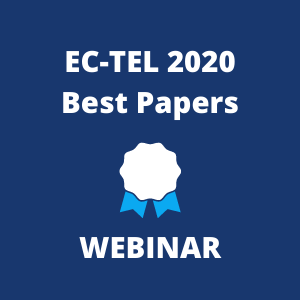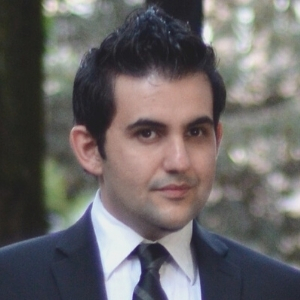
Presentation of EC-TEL 2020 best papers
26 February 2021, at 15:00 CET
The three papers that have won the best paper award at EC-TEL 2020, will be presented in an open webinar.
Each paper will be presented within 15 minutes, followed by 10 minutes of questions and answers with the audience.
Recording
Overview of the best papers
Exploring Learner-Controlled Peer Group Selection in a Technology-Enhanced Learning Environment
Authors: Kamil Akhuseyinoglu, Jordan Barria-Pineda, Sergey Sosnovsky, Anna-Lena Lamprecht, Julio Guerra and Peter Brusilovsky
Abstract: Previous research on technology-enhanced learning indicated that exposing students to information related to their peers’ performance might positively or negatively affect their behavior and performance. Recent research has demonstrated that augmenting traditional open learner models (OLMs) with peers’ learner models could boost student engagement and affect navigational patterns. However, the negative impact of social comparison has been also reported in the literature, which demonstrates that the comparison with much better-performing peers presents a threat to self-integrity. These conflicting findings have not yet been reconciled in the context of technology-enhanced learning. In this talk, I will talk about our recent attempt to extend research in social comparison in an educational context and on OLMs by examining how the potential negative and positive sides of social comparison could be balanced by enabling students to select their peers, rather than by being forced to compare themselves with an aggregated class average.

Employing Peer Review to Evaluate the Quality of Student Generated Content at Scale
Authors: Ali Darvishi, Hassan Khosravi and Shazia Sadiq
Abstract: Engaging students in creating learning resources demonstrated to have pedagogical benefits and enabled creating large repositories of learning resources that can also complement student learning in different ways. However, to effectively utilise a student-generated repository of content, there is a need for a selection process to separate high-quality from low-quality resources as some of the resources created by students may be ineffective or incorrect. A scalable approach of evaluating the quality of student-generated content is to use a peer-review process. However, this method poses the problem of “truth inference” since students’ judgments cannot wholly be trusted. In this talk, we first present an educational system that relies on peer-review for evaluating the quality of student-generated content. Based on data collected from this platform, we present and compare several approaches to discriminate between low- and high-quality resources, including expectation-maximization, feedback quality estimation using NLP techniques, ensemble models, and graph-based trust propagation.


Designing conversational agents for collaborative tasks: implications for design and practitioners
Authors: Konstantinos Michos, Juan I. Asensio-Pérez, Yannis Dimitriadis, Sara García-Sastre, Sara Villagrá-Sobrino, Alejandro Ortega-Arranz, Eduardo Gómez-Sánchez and Paraskevi Topali
Abstract: The widespread use of Conversational Agents (CAs) has also shown benefits in technology-enhanced learning scenarios. Among their different applications, CAs can support students in collaborative tasks to improve their discussions and learning. However, their implementation in real educational settings (e.g., face-to-face, distance courses) requires adapting pedagogical design elements (e.g., task design, agent intervention strategies) to the particular educational context. A field study was conducted in a university course using the CA technology developed in the colMOOC European project. The aim was to evaluate the design and implementation of two separate agent intervention strategies (knowledge-based vs social-based prompts) in a brainstorming discussion task. Results show differences in student participation, dialogue and satisfaction according to the agent design. Additional studies seek to evaluate pedagogical elements of CAs for collaborative tasks in authentic settings and derive implications for design and practitioners such as teachers and instructional designers.

Join the webinar!
The presentation will take place on February 26 2021 at 15:00 CET in Zoom.
Zoom link was published here.
We are looking forward to seeing you there!